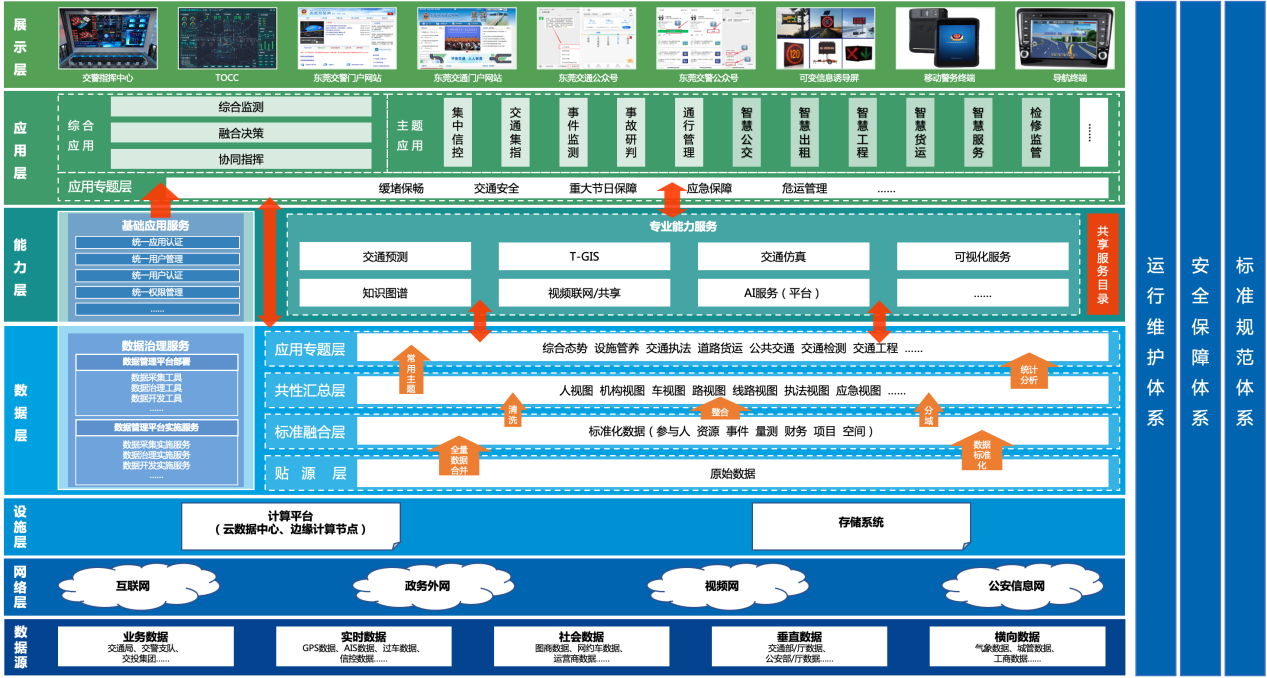
Customers: Dongguan Municipal Bureau of Transportation, Dongguan Municipal Traffic Police Brigade, Dongguan Municipal Government Service Data Management Bureau
Industry: Transportation
Products/Solutions: Smart Transportation
Keywords: Smart Transportation Data Governance TOCC

Located in the heart of the Guangdong-Hong Kong-Macao Greater Bay Area and the Guangzhou-Dongguan-Shenzhen Science and Technology Innovation Corridor, Dongguan is an important city of the "Belt and Road" and a logistics hub in the Pearl River Delta. By the end of 2020, Dongguan had 3.41 million motor vehicles, ranking second in Guangdong Province, second only to Shenzhen. The rapid growth in the number of motor vehicles has brought difficulties in parking and traffic congestion, posing new challenges to Dongguan's urban traffic management.
To tackle the limitations of Dongguan's traditional transportation construction, management and service models that are insufficient for the new demands for transportation in the Greater Bay Area, Dongguan commissioned Beiming Software to create an intelligent transportation project. This project aims to modernize traffic systems through informatization and intelligent technologies, aligning with the broader smart city framework to build a service-oriented intelligent transportation system across towns, streets, and departments, which promotes the city’s long-term development of comprehensive transportation.

"Intelligent Transportation" comprehensively integrates dynamic and static data of the city’s transportation industry, collects data from various sources, including ports, highways, buses, taxis, rails, parking lots, passengers, freight, and the Internet, realizes in-depth analysis and mining of the city's transportation data, and elevates universal business capabilities, forming a flexible and open business unit in the transportation industry.
The "Intelligent Transportation" project includes an integrated traffic monitoring and dispatch platform that provides a map of the city's traffic, thematic monitoring of each traffic sector, interconnected and dynamic traffic warnings, and comprehensive traffic monitoring supported by statistics. In addition, It also supports decision-making through a traffic knowledge base, combining decision support, traffic planning, comprehensive regulation and industry governance to develop a medium and micro traffic model. It also forms a multi-level mixed simulation model that uses the extensive traffic operational data to carry out fine simulation, supporting sophisticated management and control and emergency responses, and coordinating traffic across regions, departments, and levels in an all-around way.

1. Achieving Informatization of Traffic Management
Dongguan’s "Intelligent Transportation" project streamlined and optimized the transportation business process, established an information management model, and promoted institutional innovation. This resulted in the shifts from decentralized to centralized, and from broad to precise management, enhanced administrative efficiency and inter-departmental collaboration, and improved the business environment of the transportation departments in Dongguan.
2. Multi-Source Data Analysis to Assist Decision-Making
Beiming Software relies on the "digital government" infrastructure of cloud, network, data, and intelligence to unify the platform architecture and data standards, which has promoted the aggregation, integration, and sharing of traffic data and built the digital base of "intelligent transportation". This overcomes the "information island" and "business island" caused by the traditional organizational structure of transportation departments, realizes information sharing through data integration, clarifies the responsibilities and obligations of information sharing between transportation departments, and guides policy decision-making through the analysis of government, industry, IoT, and internet data; and cross-departmental business collaboration improves the efficiency of traffic management and service delivery as well as productivity of the government.
3. Optimizing Transportation Services
Through the release of traffic information through multiple channels, optimization of credit control schemes, intelligent management of operating vehicles and other means, Dongguan has improved the timeliness of information access, provides reasonable travel methods, and optimized main routes, along with other services, effectively shortening the travel time of citizens and improving their travel experience.

The "Intelligent Transportation" project supports the “Dongguan Quality Transportation 1000-Day Action Plan" by providing a data platform, creating a unified city-wide transportation planning map, and reserving storage, computing resources, and access space for data algorithm models, business support models, etc. It provides data standards for information system construction. The project has created a comprehensive demonstration area for intelligent transportation that integrates perception, control, service, and empowerment, forming a city-wide radiation effect. Leveraging the construction of intelligent transportation, Dongguan has accelerated the research and application of new-generation information technology represented by cloud computing, big data, the Internet of Things, etc. Supported by infrastructure construction and shared information resources, and driven by intelligent application systems, Dongguan has promoted the extensive application of information technology in fields such as public services and urban refined management.